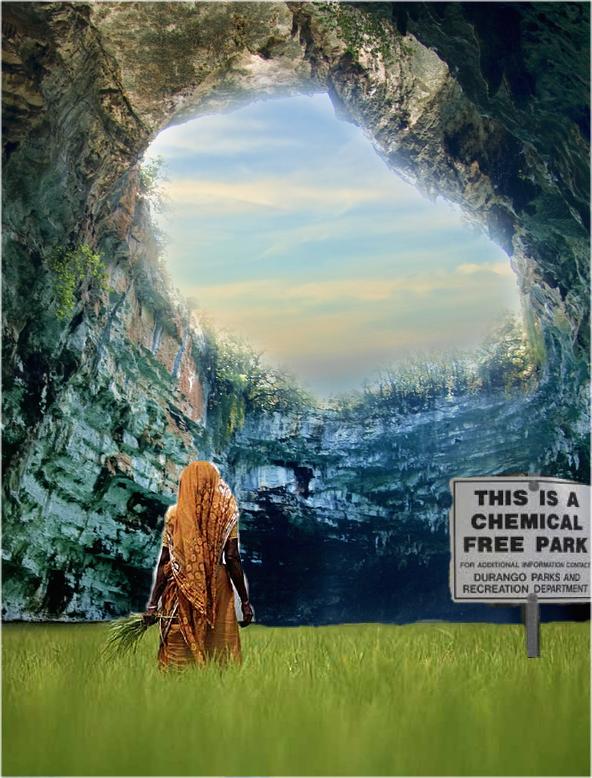Are you worried that genetically modified corn will imperil the earth and ruin your organic sticker status if the air blows toward your fields?
Horticulturalists have a solution; let science grow transgenic crops that can feed billions and create high-value medicinal antibodies. Organic believes can put their corn in caves.
Okay, Cary Mitchell, professor of horticulture at Purdue, isn't actually saying that, he is flipping those around, but there are 3 good reasons why caviculture (yes, I just inventified that word) makes more sense for people who want to get a head start on creating their own Doomsday Vault and let the modern world ruin itself by being progressive.

Image this organic Mecca. Images: Melissani caves in Greece from iliketowastemytime.com. Awesome girl pic from AllowGoldenRiceNow. Chemical-free pic from a gullible activist in Colorado, via Dr. Steve Savage
First, the proof of concept. If you have raised corn, you know it grows tall and it likes sunshine and heat - caves are 0 for 3 in those areas in most cases. So Mitchell, Yang Yang and Gioia Massa ventured into an old limestone mine and built a greenhouse complete with insulation and yellow and blue high-intensity discharge lamps. They controlled light, temperature, humidity and carbon dioxide and the corn responded well. With that control in place, they decided to borrow an old technique used to make dwarf Christmas poinsettias; they dropped the temperature to 60 degrees Fahrenheit for the first 2 hours of 'daylight', then the temperature was restored to 80 degrees for 14 hours and then lowered to 65 degrees for eight hours of darkness.
That temperature dip not only saved Gaea from the impact of more energy spent on heat, it led to a reduction in stalk height of 10 percent and a diameter reduction of 9 percent - without a difference in number of seeds or their weight. That's a good result, especially where horizontal and vertical space is at a premium.
The horticulturists had the idea to grow transgenic crops in caves but here are 3 good reasons that organic farmers should adopt it instead:
1) Caves have lots of natural carbon dioxide - because cave CO2 is natural and organic, it is superior to man-made carbon dioxide and your food will taste better and have more antioxidants.
2) It's a cave. Organic food is a $35 billion a year business, almost everyone who wants to has paid for a sticker and filled out some paperwork by now - and, like 'natural', organic has little meaning since there are dozens and dozens of synthetic ingredients allowed in organic food and it uses more pesticides and environment leeching fertilizer than scientific farming. Since there is no annual testing of fields, there's no way to know if food is really organic or not, especially if it is imported from overseas. But caves are easy to check - just walk up to the cave and look inside and see if food is growing in there.
Plus, if you want to separate yourself from people just following the organic fad and truly embrace the ways of our forefathers, you shouldn't pick the early 1990s as the demarcation line between organic and abomination of nature, you should go back before mutagenesis and every other scientific technique that has genetically modified food for 12,000 years. That also means caves.
3) It has a certain cachet. If you are reading this in a Whole Foods, let's face it, you are rich - that's why Whole Foods built a store near you. Cave-Grown Organic is a cool label. Yes, it's going to be more expensive, but you can't put a price on health. Non-cave food, vaccines and government health care can be left to poor people.
Am I onto something with this idea? Let me know in the comments.
Citation: Yang Yang, Gioia D. Massa, Cary A. Mitchell, 'Temperature DIP at the beginning of the photoperiod reduces plant height but not seed yield of maize grown in controlled environments', Industrial Crops and Products Volume 53, February 2014, Pages 120–127 http://dx.doi.org/10.1016/j.indcrop.2013.12.002




Comments